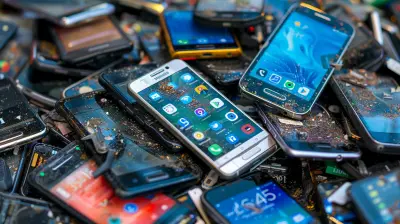The Green Revolution in Tech: How Companies Are Going Carbon Neutral
17 June 2025
Technology has taken over our lives, but let's be honest—it's been a bit of an environmental villain. From power-hungry data centers to e-waste piling up like a bad habit, the tech industry hasn't exactly been Mother Nature’s best friend.
But things are changing. Fast.
Welcome to the Green Revolution in Tech, where companies are finally stepping up their game and working toward a carbon-neutral future. But how are they pulling it off? And more importantly, is it working? Let’s dive in. 
🌱 Why Tech Giants Are Racing to Go Green
Tech companies love speed—faster processors, quicker downloads, and now, rapid moves toward sustainability. But what's driving this green push?1. Consumer Demand
People are woke (in the best way possible). Customers care about where their gadgets come from, how they’re made, and what happens to them afterward. Brands that don’t prioritize sustainability risk losing loyal users.2. Regulatory Pressure
Governments aren’t playing around anymore. Stricter environmental laws and carbon taxes mean companies have to clean up their act—or pay the price.3. Corporate Responsibility (And PR Points)
Tech giants love good PR. Going carbon-neutral makes them look like heroes while also benefiting the planet. Win-win, right?
⚡ How Tech Companies Are Going Carbon Neutral
So, what’s the secret sauce? How are companies tackling carbon emissions and making their operations eco-friendly?1. Switching to Renewable Energy
Big Tech firms are aggressively investing in wind, solar, and hydro power.- Google has been running on 100% renewable energy since 2017.
- Apple claims all its offices and stores worldwide are powered by clean energy.
- Microsoft is aiming to be carbon-negative by 2030 (yep, negative, as in removing more carbon than they emit).
It's simple: The sun and wind don’t send utility bills.
2. Energy-Efficient Data Centers
Ever wonder where all your cat videos and vacation selfies live? They’re chilling in massive data centers—giant, power-guzzling warehouses of servers. These buildings consume insane amounts of electricity.To cut down on that energy use, companies are:
✅ Using AI to optimize cooling systems
✅ Relocating data centers to cooler climates (some are even underwater—hello, futuristic Atlantis!)
✅ Using advanced cooling technologies like liquid immersion
3. Carbon Offsetting & Capture
Since eliminating emissions entirely is nearly impossible, companies are balancing the scales with offsets.This means:
- Planting trees (a timeless classic)
- Investing in carbon capture tech (fancy machines that literally suck CO₂ from the air)
- Funding conservation projects (because saving the rainforest is never a bad idea)
4. Sustainable Product Design
E-waste is a nightmare. Millions of old phones, laptops, and chargers end up in landfills every year. But brands are finally getting smarter about sustainability:- Fairphone makes modular phones you can repair instead of replacing.
- Dell and HP are using recycled plastic in their laptops.
- Apple launched a robot named Daisy that disassembles old iPhones to recover materials. (The recycling robot uprising is upon us!)
5. Eco-Friendly Supply Chains
It’s not just about what happens inside tech companies. Many emissions come from their suppliers.That’s why companies are:
👉 Partnering with green manufacturers
👉 Using recycled materials in packaging
👉 Pushing their suppliers to adopt clean energy 
🚀 The Challenges of Going Carbon Neutral
Of course, going green isn’t as easy as flipping a switch.💰 High Costs
Renewable energy, carbon capture, and sustainable materials aren't cheap. For smaller companies, the price tag can be a deal-breaker.📦 Supply Chain Struggles
Large companies rely on thousands of suppliers, many of which operate in countries where sustainability isn’t a priority. Getting everyone on board? Tough.🎭 Greenwashing
Some companies claim they’re environmentally friendly, but dig deeper and… not so much. There's a fine line between genuine action and marketing fluff.
🌎 The Future of Green Tech
So, what's next?1. More AI-Powered Sustainability
AI is a game-changer in reducing waste and optimizing energy use. Expect smarter, self-regulating systems that minimize carbon footprints effortlessly.2. Breakthroughs in Carbon Capture
Right now, capturing CO₂ is expensive and inefficient. But new tech could make it mainstream—like installing carbon-absorbing panels on buildings.3. Bigger Push for Circular Tech
Throwaway culture is dying. Future devices might be modular, repairable, and endlessly recyclable. Think phones with replaceable parts rather than glued-together bricks.4. Companies Going Beyond Carbon Neutral
Carbon neutrality is just the start. The real goal? Carbon negative—removing more carbon from the air than they produce.💡 What Can You Do?
You don’t need to be a billionaire CEO to make a difference. Here’s how you can contribute to the green revolution in tech:✅ Choose brands with strong sustainability commitments
✅ Recycle your old gadgets properly (please don’t just toss them in the trash)
✅ Opt for energy-efficient devices
✅ Support companies that repair rather than replace
Small changes add up.
🌿 Final Thoughts
The tech industry has a long way to go, but the green revolution is real. Companies are pushing for sustainability, whether through renewable energy, better recycling, or AI-driven efficiency.Will every tech giant go fully carbon neutral? Maybe not tomorrow. But the wheels are in motion, and the industry is shifting toward a greener future.
And hey, if a robot named Daisy can dismantle iPhones to save the planet, maybe we can do our part too.
all images in this post were generated using AI tools
Category:
Sustainable TechAuthor:

Kira Sanders
Discussion
rate this article
3 comments
Carina Underwood
Finally, tech companies are going green! Now if only my phone would stop turning my solar-powered mood into a battery-draining meltdown during video calls. Who knew eco-friendly could be so exhausting?
June 22, 2025 at 11:53 AM

Kira Sanders
I appreciate your humor! Balancing eco-friendliness with tech demands can be tricky, but it's a step in the right direction. Hang in there!
Capri McAnally
The Green Revolution in tech is more than a trend; it's a necessity. Companies are smartly shifting towards carbon neutrality, proving that sustainability can drive innovation. While flashy tech may grab headlines, it’s the eco-conscious strategies behind the scenes that will define the industry’s future. Time to innovate sustainably!
June 21, 2025 at 10:50 AM

Kira Sanders
Thank you for your insightful comment! You're absolutely right—sustainability is not just a trend; it's essential for driving future innovation in tech. The shift towards carbon neutrality will indeed shape the industry's trajectory.
Coral McAdoo
Great read! It's inspiring to see tech companies embracing sustainability. Every step towards carbon neutrality counts, and it's a relief to know that innovation can support a healthier planet.
June 21, 2025 at 4:33 AM

Kira Sanders
Thank you! I'm glad you found it inspiring. Every effort towards sustainability truly makes a difference!



